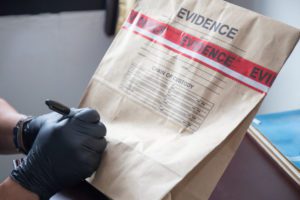 The New Jersey Supreme Court continued in relevant part: Jones acknowledged that her son and Hannah were drug dealers who sometimes worked together, and she testified to a number of comments Thomas made to her that suggested he had participated in the killings and planned to frame Hannah for them. The court rejected defense counsel’s argument that the testimony of Mary Jones was admissible under the co-conspirator’s exception to the hearsay rule. Defense counsel did not argue that Thomas’s admissions to his mother constituted statements against interest under N.J.R.E. 803(c)(25), nor did the court address that alternate ground for the admissibility of Jones’s testimony. In her summation remarks, the prosecutor told the jury, “There is not a stitch, a scintilla, a scintilla, a bit, an ounce, a piece of evidence, that links Thomas to that murder.” The Appellate Division affirmed, determining that Thomas’s statements to Jones were not admissible as statements against interest. The Court denied certification.
The New Jersey Supreme Court continued in relevant part: Jones acknowledged that her son and Hannah were drug dealers who sometimes worked together, and she testified to a number of comments Thomas made to her that suggested he had participated in the killings and planned to frame Hannah for them. The court rejected defense counsel’s argument that the testimony of Mary Jones was admissible under the co-conspirator’s exception to the hearsay rule. Defense counsel did not argue that Thomas’s admissions to his mother constituted statements against interest under N.J.R.E. 803(c)(25), nor did the court address that alternate ground for the admissibility of Jones’s testimony. In her summation remarks, the prosecutor told the jury, “There is not a stitch, a scintilla, a scintilla, a bit, an ounce, a piece of evidence, that links Thomas to that murder.” The Appellate Division affirmed, determining that Thomas’s statements to Jones were not admissible as statements against interest. The Court denied certification.
In his first petition for PCR, Hannah asserted ineffective assistance of counsel by his trial and appellate attorneys, claiming, among their deficiencies, their failure to adequately present the case for the admission of the testimony of Thomas’s mother. The PCR court denied the petition without an evidentiary hearing; after the Appellate Division remanded for a hearing, the PCR court again denied relief. The Appellate Division affirmed; the Court denied certification, and the federal district court denied Hannah’s habeas corpus petition. Hannah’s copy of the case file, including trial discovery and transcripts, was lost during a lockdown at Trenton State Prison, and Hannah received a replacement copy.
Hannah averred that, for the first time, he observed the Redd Report, which disclosed that Thomas responded to a pager number found in the victims’ car. In his second PCR petition, Hannah moved for a new trial based on newly discovered evidence. In January 2008, the PCR court denied Hannah’s petition without an evidentiary hearing. In February 2008, Hannah’s former PCR counsel certified that, to his recollection, the Redd Report did not appear in the file provided to him by the Public Defender’s Office.
The amount of time and resources involved with the litigation of this and many murder trials, appeals, and collateral attacks is staggering. This consideration likely plays an unspoken part in the analysis of the three-judge dissent.
